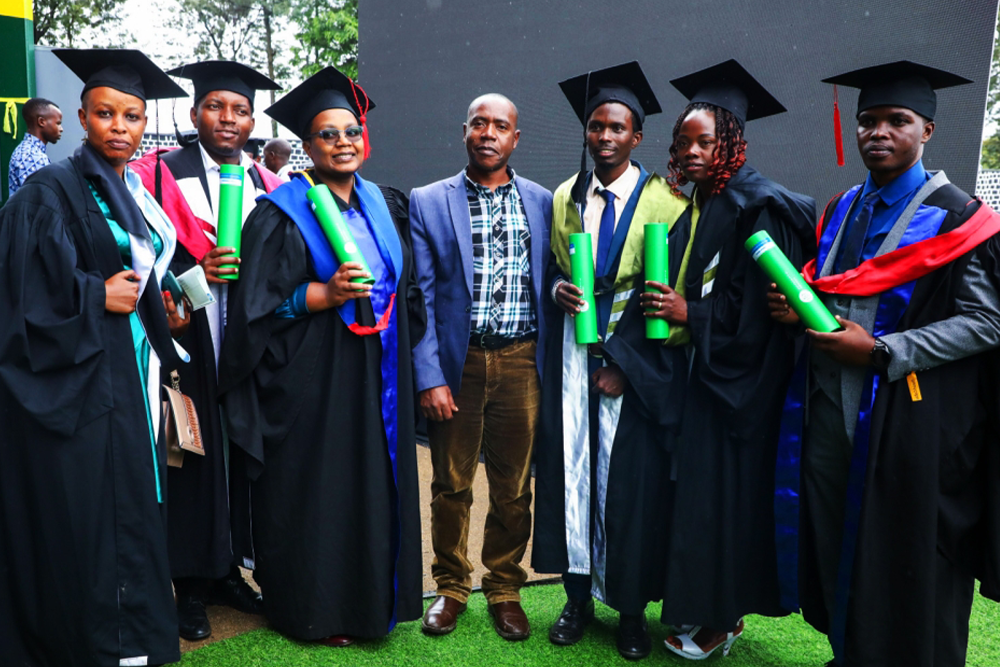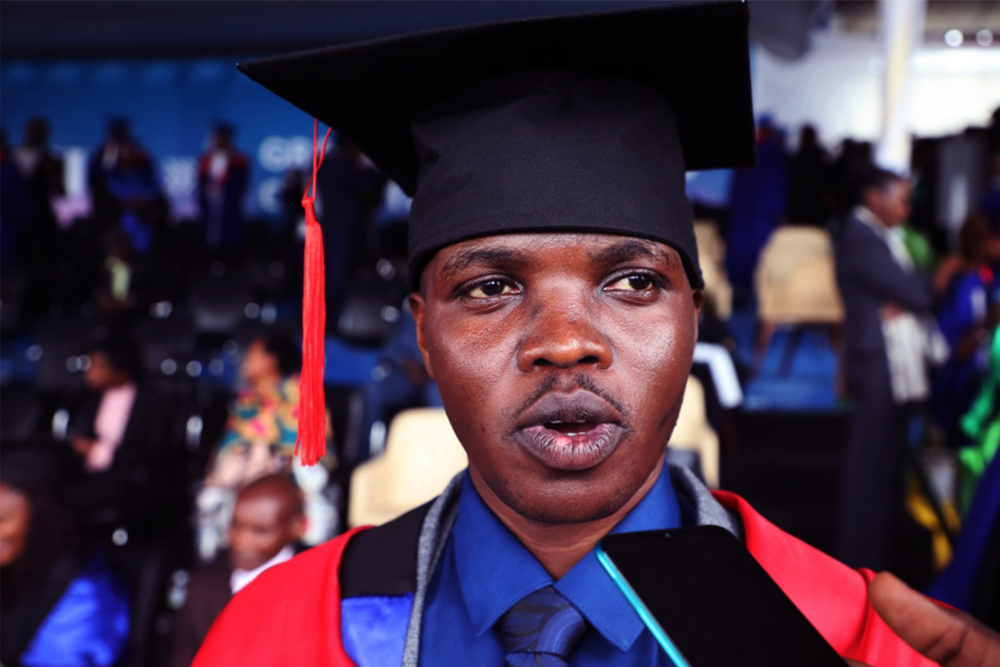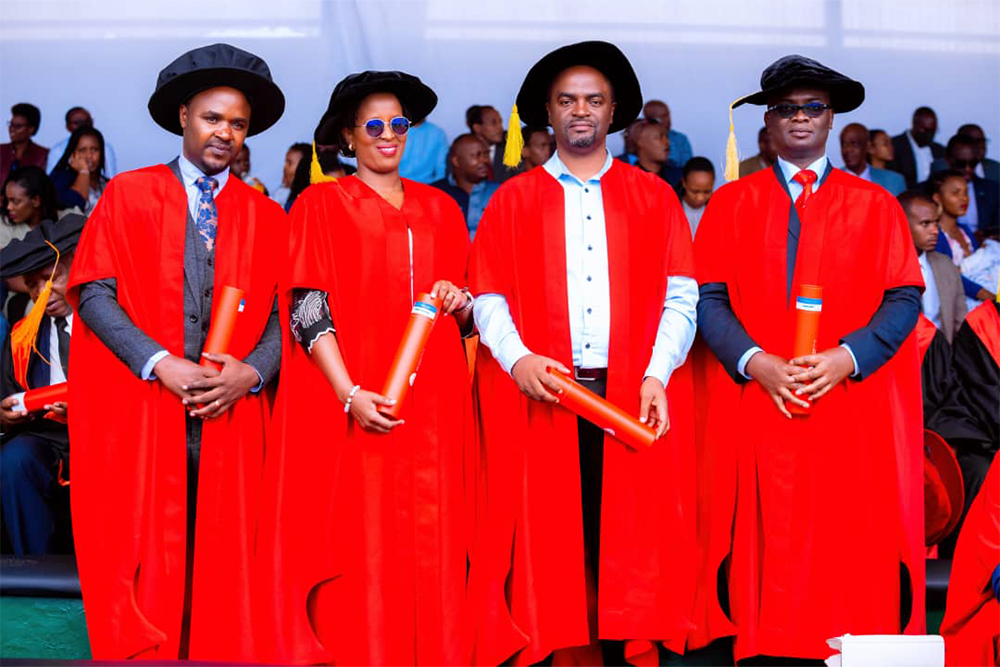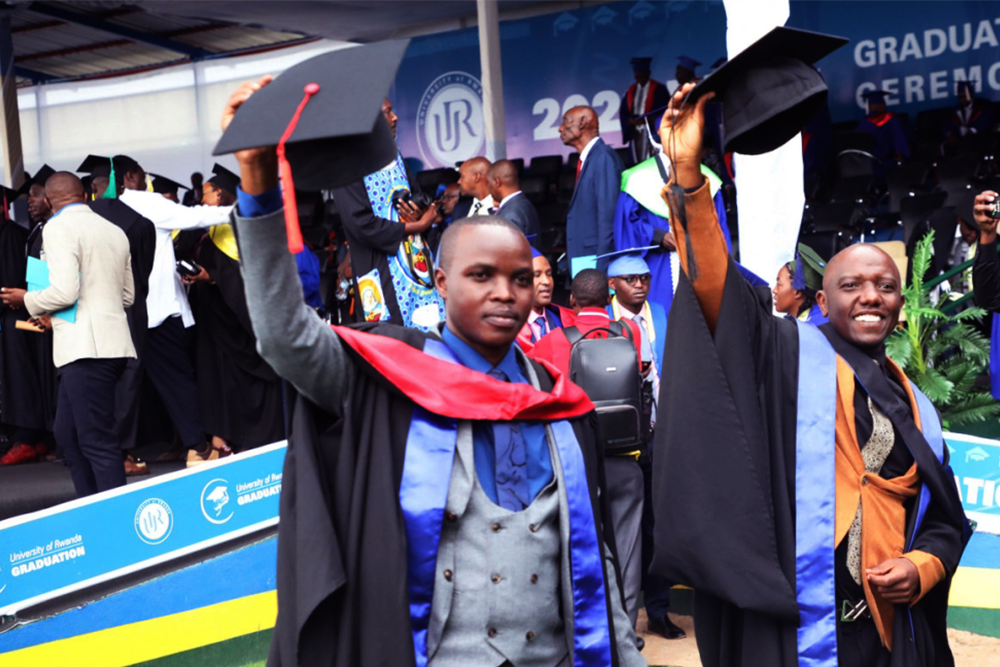UR’s Internet of Things graduates lead innovation, forge future with practical solutions
The African Center of Excellence in Internet of Things (ACEIoT) within the University of Rwanda (UR) has been a breeding ground for innovative minds who are ready to forge the future with practical solutions and solve real-world problems within their communities.
This was observed during the UR’s 9th graduation ceremony held on November 17, at Ubworoherane stadium, Musanze district in Northern province.
Among the 8,321 graduates, 43 individuals with a background in IoT have been showcasing remarkable projects and sharing invaluable experiences especially in their final year thesis.
This was marked on November 10, during the inauguration of UniPod, a United Nations Development Programme (UNDP) African Regional Bureau initiative aimed at promoting innovation, inter-disciplinary research, and nurturing the next generation of innovators and entrepreneurs in university.

Damien Hanyurwimfura, an Associate Professor and the Acting Director of the African Center of Excellence in Internet of Things (ACEIoT), College of Science and Technology (CST), UR, emphasized the significance of hands-on learning and practical applications in IoT education.
He said: “The internet of things, artificial Intelligence and robotics are emerging technologies that are impacting the lives of people, changing the way things are done and improving people’s lives.”
“The curriculum offered in the center of Internet of Things,” he continued, "is evolving and updated with the new technology to assure that the students get the updated knowledge to respond to people and business needs.”
He noted: “There are many projects which are developed by students and faculty members in response to the call for applications targeting the current needs on the market. Those are the projects funded by the external partners.”
“Therefore, the center collaborates with different partners private and public, local and international who support the center in enhancing the quality of teaching and research offered to the students,” he said.
Hanyurwimfura added: “Locally, the center collaborates with private industries such as FabLab, ICT Chamber, Digital Umuganda, Narada LTD, STES Group to address the local societal challenges in joint research collaborations.
They offer internship placement to the center students.
In public institutions, the center collaborates with the National Council for Science and Technology (NCST), Rwanda Development Board (RDB), and Carnegie Mellon University, Rwanda Information Society Authority (RISA) and many more.
“Some of them like NCST provided grant funds to implement the project solving local challenges,” he noted.
Other implemented projects are funded by international funders like PASET, Chemonics, Ruforum, Horizon, US embassy, Enabel, to mention but a few.
Meanwhile, some students echoed similar sentiments, highlighting how their projects not only honed their technical skills but also empowered them to solve real-world problems within their communities.
Among them is Gasana Bisetsa Jururyishya, a Masters graduate in IoT, specialized in Wireless Intelligent Sensor Networking whose project is named ‘Farm Vision’, The goal of his creation is to address challenges in the agricultural sector by creating a system that enables farmers to forecast and monitor the health status of their crops.
The device, which can be installed in the farm, utilizes an AI model to capture and analyze images, identifying potential issues such as pests. Farmers will be receiving notifications, allowing them to take timely action without physically visiting the farm, streamlining crop management and enhancing overall efficiency in agriculture.
Equally, Zephaniah Bizimana also graduated in IoT, developed ‘Smart Device for Electricity Usage, Fraud Detection and Prevention’. This device aimed at capturing the customers who may steal electricity by reporting them, and start counting the stolen electricity.
“This device shows the address of the fraudsters and it is also able to trace which device (appliance) is consuming much electricity,” he said.

“Data is stored in the cloud for real time monitoring and quick reaction to the fraud being done. This system allows the energy utility managers to detect and monitor power usage at the household level in real-time and helps to reduce power theft activities,” he added.
As per data provided by IoT Director, for the master’s Programme, the first cohort 1 started in 2018 and graduated with 32 in 2021(the graduation delay was due to the COVID 19 pandemic), the second cohort graduated 40 in 2022. Currently, there are 39 students from the third cohort making a total of 111 masters graduates.
And for the PhD program: The first cohort started in 2017, and by 2022, 9 students had graduated. Now, in 2023, there are 4 students, making a total of 13 graduates overall.





